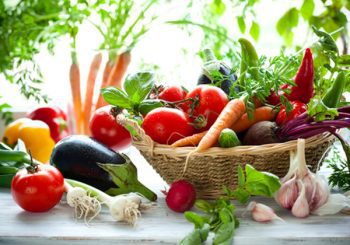Contributing writer for Wake Up World
Originally published at onlineholistichealth.com & reproduced here with permission.
You find a food that you love and then eat it daily, month after month, like listening to your favorite song. Sound familiar? However, the real question is, can eating the same foods year round have an effect on your health?
With the introduction of processed foods in the 1950s, the ability to transport food worldwide and the introduction of large-scale supermarkets, most foods are now available to us at any time of year. And though this may seem like a luxury, it has caused us to forget what it means to eat seasonally, and most importantly, it has deprived us of the many nutritional and emotional benefits of seasonal eating.
And let’s not forget about the burden that processing and shipping place on our environment (But that is a whole other discussion).
Seasonal eating often means eating what is locally harvested and this is good for our bodies, spirit and the environment.
Historically, seasonal eating was never a question. All over the world people instinctually ate foods when nature produced them. They would build their meals around foods that were harvested during their peak season and naturally customized their diets to meet the challenges of the different seasons.
For example, during the winter months when their bodies needed more warmth they would prepare heavier meals with root vegetables and animal proteins. Generally, more animal proteins were consumed in the fall and winter months when fresh produce was scarce. In the spring, as crops were planted and harvested, people would begin incorporating more fruits and vegetables into their meals, and then in the summer would consume a mostly plant-based diet. And the different seasons would also offer different flavors, textures, and aromas – as the saying goes, variety is the spice of life!
When produce is grown in its preferred season and under appropriate growing conditions it grows to its fullest potential and maintains all of its natural nutrients.
Produce that is shipped is generally picked prior to ripening so that it doesn’t rot in transit, however fruits and vegetables that are picked prematurely and held for a longer period of time have less nutritional value and flavor. Choosing fruits and vegetables during their natural growing season ensures that they are fresh and nutrient dense because produce picked at its peak contains more vitamins, minerals, and antioxidants.
And there is something else, I don’t know about you but when I was a kid I remember the amazing sweet smell of fresh fruits and vegetables that instantly hit my nose when I walked into the produce section of a grocery store. Today the smell is gone, along with most of the flavor! Have you noticed this too?
Of course, having the ability to process and ship foods to regions not native to the product has made consumption of these products very convenient, but the question still remains – does this convenience improve overall health or hinder it?
And let’s not forget that there is also an emotional component to seasonal eating in that it connects us to the calendar and often to positive memories.
Recall how it feels cutting into a juicy red tomato on a warm summer evening or the smell of corn roasting at a late summer bonfire? Picture yourself walking through an apple orchard on a clear brisk day and then biting into the first piece of fruit that you pick from the tree. Is it tart, sweet or maybe somewhere in between? Maybe for you, it’s the introduction of the holiday season with family gathered around enjoying the comforts of being together over mouthfuls of homemade cranberry sauce.
Seasonal eating is also the foundation for many ancient medicinal traditions which view it as essential for health and emotional balance. If we eat according to the season then we are in harmony with our external environment and can adapt better to change, prevent illness and maintain a positive and peaceful state of mind. And a perfect example of this is with Traditional Chinese Medicine.
Traditional Chinese Medicine (TCM) has been practiced for more than 2000 years and for the Chinese people of 2000 years ago, it was not hard to rise at sunset, go to bed at nightfall, and grow and eat foods as nature intended.
In TCM it is believed there are five elements that make up the material world. These elements are all interconnected, much like the seasons, and have their own unique personalities.
- Wood (Spring)
- Fire (Summer)
- Earth (Late Summer)
- Metal (Autumn)
- Water (Winter)
TCM offers a holistic approach to health through its various modalities which include Acupuncture, Herbal medicine, Qi Gong, Tui Na (Chinese massage), and important for this topic – Dietary therapies.
Healthy Seasonal Foods from the TCM Perspective
TCM’s dietary therapy starts with foods having a temperature and an energetic property. The different temperatures are cold, cool, neutral, warm and hot, and energies are either predominantly Yin or Yang.
The foundation of TCM is the balance of Yin and Yang, represented as night and day, cold and hot and other opposing yet complementary energies.
Yang represents movement and warmth, whereas Yin is restfulness and cold.
So as a rule of thumb, foods that grow in the sun are Yang in nature, whereas those that grow in the earth and darkness are Yin.
Yin foods are also generally soft, wet and cool, whereas Yang foods are hard, dry and spicy.
Knowing the energetic properties of food is very important for obvious reasons. If someone is suffering from a disease such as rheumatism, then eating warm foods would be beneficial. On the other hand, if someone is suffering from heartburn, cold or cool foods would be beneficial (More on this subject can be found: Food and Emotions from a Traditional Chinese Medicine Perspective and Frequency and Energy of Food For Your Health & Soul).
It is important to also take into consideration the flavors of food:
- Sour – Wood – Spring
- Bitter – Fire – Summer
- Sweet- Earth – Late Summer
- Pungent – Metal – Autumn
- Salty – Water – Winter
These flavors are associated with the various elements, network systems, and the different seasons as outlined below.
Spring is a time of expansion, upward movement, planning and envisioning the future. It is a time for renewal. This is a perfect time for a detoxification, much like spring cleaning.
According to TCM, spring relates to the Wood element and the Liver network system. The Liver controls the flow of Qi (energy) and blood in the body. Detoxification can be achieved through the movement of the Qi and blood.
Since spring is related to the flavor of sour, adding lime or lemon to your water is a great way to aid your liver in detoxification. Also, vinegar such as Apple Cider Vinegar is encouraged especially at this time of year.
Foods recommended for spring include:
- Raw Onions
- Leeks
- Leaf mustard
- Chinese yam
- Lemons and Limes
- Dates
- Cilantro
- Mushrooms
- Fresh greens and leafy vegetables
- Lighter meats like Free-range Chicken
Summer relates to the Fire element and the Heart network system and is considered a time for growth and ripening. The summer brings forth much energy and movement as fire rules the heart, mind, and spirit.
It is recommended that cool foods such as salads and raw vegetables be consumed. Cool Yin foods are moistening and counterbalance the heat. It is also advisable to eat foods with more bitter flavors such as:
- Cucumbers
- Tomatoes
- Goji Berry
- Broccoli
- Kale
- Parsley
- Asparagus
And animal proteins such as:
- Cornish Hen
- Most Fish
Late Summer relates to a time of transition of not just seasons, but also a time of stabilizing the earth such that it welcomes the calming, nourishing, and regrowth which comes after the high activity of spring and summer. Thus the element of Earth.The element of Earth relates to the pancreas, stomach, and spleen. Since this organs break down, aid in the circulation of nourishment, and regulate sugar, it is not surprising that the primary flavor for this time a year is sweet.
Of course, when most of us think of something sweet, we may imagine a cake, candy, or ice cream however though indulges like these may nourish the soul, remember in large quantities they can easily be harmful to the body.
Instead, think of the sweet taste as nature intended such as:
- All Fruits
- Sweet potatoes
- Corn
- Squash
- Cooked onions
- Shrimp
- Crab
- Salmon
Autumn is a time for withering and slowing down growth. The weather is cooling so it is also a time to reduce the number of cooling foods you consume.
Autumn relates to the Metal element and the correlated flavor of Pungent which disperses a “hot” or Yang energy that is thought to be beneficial for the lungs and large intestines.
This is the time a year to go for heartier ingredients and meals that take longer to cool. Food recommendations for autumn include:
- Garlic
- Ginger
- Cabbage
- Chili
- Daikon Radish
- Eggs
- Pheasant
- Duck
- Bisson
Winter is a time to hunker down, conserve and build strength for spring. This season relates to the Water element and the Kidney network system. The correlating flavor is Salty.
Side Note: Since the adrenals are part of this network system, it makes sense that “Salty’ is the dominating flavor as a lack of salt causes a decrease of stress-related hormones. Over time, this may be diagnosed as Adrenal Fatigue.
Kidney tonifying foods are important during the winter months. Food recommendations for the winter include:
- Roasted nuts
- Bone Broth
- Miso
- Black beans
- Molasses
- Dark leafy greens
- Sea Vegetables
- Grass-fed red meat
- Venison
No matter the season, I always recommend that for optimal health, all food should be local, fresh and organic when possible.
Eating seasonal foods that you grew in your own garden, purchased from a local farmer’s market or that were suggested by a TCM practitioner will not only all provide great nutritional support but also emotional benefit.
So take a moment and think about your own eating habits. Do you have a tendency to eat differently during the different seasons? Take note of the foods that come to mind when you think about each of the four seasons.
Here are some more questions and ideas to contemplate:
- Do you find that you eat differently during each of the four seasons, or do you habitually eat the same foods throughout the year? How many processed foods do you consume?
- Eating fruits and vegetables grown in their natural environment and picked at their peak ripeness ensures that they are fresh and nutrient dense. Now that you know there are health benefits to eating seasonally, does this inspire you to eat more local and seasonal foods?
- After reading about Traditional Chinese Medicine dietary therapies, why not incorporate some of the recommended seasonal foods into your diet and see how it affects your health.
- What questions come to mind when thinking about eating specific foods to maintain balance and harmony during each of the seasons vs eating foods picked prematurely, processed and shipped to distant destinations?
- Can you think of foods that spark an emotional response and how do you think that affects your health?
I’d love to hear your thoughts!
Recommended articles by Dr. Michelle Kmiec:
- Ready to Make Life Changes But Don’t Know Where to Begin?
- 4 Simple Ways to Relieve Tension and De-Stress Your Body
- Could Glutathione Be the Key to Slowing the Physical Aging Process?
- Serrapeptase: an Enzyme That Treats Inflammation, Arthritis, Scar Tissue and More
- The Truth About Insomnia, Depression and Anxiety
- Natural Cure for Depression Silenced?
- The Link Between Stress and Intestinal Parasites – and What to Do About Them
- The Sun and Skin Cancer: the Truths, Pseudo-Truths and Lies of Mainstream Science
- A Natural Cure for Migraines
- Natural Cure for Chronic Pain Syndromes Silenced by the Medical Establishment
About the author:
 Dr. Michelle Kmiec is a board-certified chiropractic physician who also holds a Bachelor of Science degree in Human Biology, and a minor in Medical Research. She is a life-long athlete who after curing herself 100% naturally from MS and chronic anxiety, became an avid nutrition health researcher/promoter.
Dr. Michelle Kmiec is a board-certified chiropractic physician who also holds a Bachelor of Science degree in Human Biology, and a minor in Medical Research. She is a life-long athlete who after curing herself 100% naturally from MS and chronic anxiety, became an avid nutrition health researcher/promoter.
She has been featured in many Health magazines and has been a guest on radio talk shows in the USA, Canada, United Kingdom, and Australia. She is the author of the book “Healthcare Freedom Revolution: Exposing the Lies, Deceit and Greed of the Medical Profession”, Founder of Online Holistic Health, and a contributing writer for other popular informative health website/blogs. She is also co-founder of Crazy Meets Common Sense! – the Podcast that makes sense out of the crazy, to help you live a more healthy, fulfilling and empowering life!
For more, visit OnlineHolisticHealth.com or connect with Dr. Michelle Kmiec on Facebook, Twitter and LinkedIn.

If you've found value in our articles, we invite you to support the release of our brand-new book, "Gratitude Practices for Kids: A Practical Guide for Adults to Instill a Spirit of Appreciation and Positivity in the Next Generation."
"Gratitude Practices for Kids" brings together over 25 innovative and accessible practices designed to enhance gratitude in everyday life. This comprehensive guide is backed by 17 scientific studies, ensuring each concept is grounded in research, underscoring our commitment to nurturing growth, emotional intelligence, and positive interactions between adults and children.
We encourage you to opt for the paperback version to celebrate this new release. Dive into its fresh pages away from digital distractions, allowing you to immerse yourself in the transformative practices it offers.
Over recent years, Wake Up World has faced significant online censorship, which has impacted our financial ability to operate. Moving into book publishing represents a strategic step to secure the ongoing funds needed to continue our mission. By purchasing Gratitude for Kids, you help us keep our content free and accessible to everyone, avoiding needing a paywall. With over 8,500 articles published in the last 13 years, we remain dedicated to keeping our valuable content open to all.








